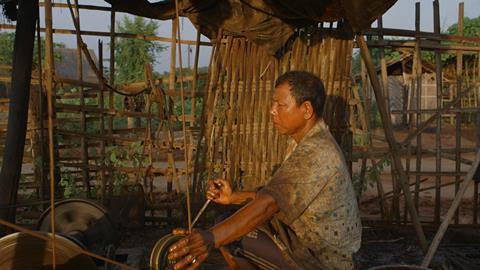In Myanmar, a couplle drill for oil by hand and hope for better days in Saeed Farouky’s award-winning documentary

Dir/scr: Saeed Taji Farouky. France/Switzerland/Netherlands/Palestine 2021. 91 minutes
A glimpse into a corner of the global oil industry that’s a universe away from the Dallas, Giant and There Will Be Blood, Palestinian-British documentarist Saeed Taji Farouky’s A Thousand Fires focuses on one minute, hardscrabble artisan operation in rural Myanmar. An empathetic work of fly-on-the-wall observation elevated by adventurous touches of directorial flair, it won a prize when premiering in the Critics’ Week at Locarno and bows internationally in the main competition at IDFA. A solid choice for non-fiction-oriented festivals, channels and services, this confirms London-based globetrotter Farouky as a distinctive voice in semi-journalistic reportage.
This is a low-key, quiet film but one of beguilingly vivid sensory impact
Farouky’s solo feature-length debut, sports-themed and Western Sahara-set The Runner (2013) made less impact than his co-directorial outing with Michael McEvoy two years later. An impressive haul of prizes and nominations for Tell Spring Not To Come This Year (2015) — delving behind the headlines of the ongoing conflicts in Afghanistan — included the Amnesty International Award at the Berlinale. Given that picture’s squarely political focus, it’s perhaps surprising that social and governmental upheavals in Myanmar play so little role in A Thousand Fires.
Then again, such developments — chiefly confined to urban areas — evidently impinge little on the daily lives of middle-aged couple Htwe Tin and Thein Shwe, former farmers who have switched to hand-drilled oil extraction in a secluded, remote corner of the countryside where such operations are evidently common (hence the title). While not exactly backbreaking work, the labour is long and the yield often quite low; the pair dream of a very different life for their teenage son Zin Ko Aung. His prowess as a footballer offers a potential escape-route from the grimy world of his parents; the latter regularly consult fortune-tellers for guidance about what the future might bring and how it might perhaps be influenced in a positive direction.
Working as his own cinematographer and in tandem with the skilled digital colourist Erik Demeris, Farouky — with his sharp, sophisticated eye for composition and telling detail — conjures a lush world of verdant foliage amid dust and mud of myriad brownish shades. This is a low-key, quiet film but one of beguilingly vivid sensory impact. Occasional offbeat interludes (including semi-abstract, close-up studies of whorling oil-slick surfaces, and the minute inspection of a glistening snakeskin in deep chiaroscuro) function as punctuating grace-notes.
Another key collaborator is the hugely experienced French editor Catherine Rascon, whose work with Chinese master Wang Bing ranges from 54-minute miniature Coal Money (2009) to the gargantuan 8-hour Dead Souls (2018). Here she captures the languid rural rhythms of Htwe and Thein’s quotidian grind, interpolating glimpses of shadowy fortune-teller sessions and of Zin’s nascent sporting career as effective counterpoint — even if the lad’s story does feel as though it might be better suited to stand-alone treatment.
In welcome contrast to the surfeit of current documentarians who veer towards excessive scoring, meanwhile, Farouky deploys Fatima Dunn’s music with sufficient restraint and intelligence that it becomes an embellishment rather than a distraction. And, in one last crucial touch of inspiration he rounds off A Thousand Fires in hauntingly resonant fashion with soulful Azerbaijani chanteur Alim Qasimov’s seven-minute anthem “A Trace of Grace.” Qasimov, a legend in the mugham tradition of semi-improvised folk music but somewhat underappreciated beyond his region, may find himself cropping up on further soundtracks and concert-bills as a result of his exposure here.
Production companies: Les films du Balibari, Akka Films, BIND
International sales: Square Eyes, info@squareeyesfilm.com
Producers: Estelle Robin You, Palmyre Badinier, Joram Willink
Editing: Catherine Rascon
Cinematography: Saeed Taji Farouky
Music: Fatima Dunn















![[L-R]: Amanda Villavieja, Laia Casanovas, Yasmina Praderas](https://d1nslcd7m2225b.cloudfront.net/Pictures/274x183/6/4/1/1471641_pxl_20251224_103354743_618426_crop.jpg)








